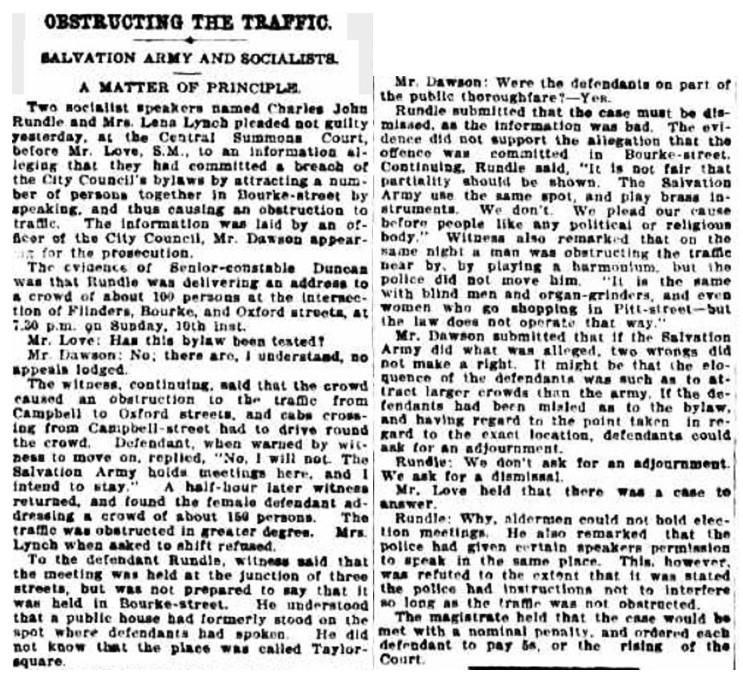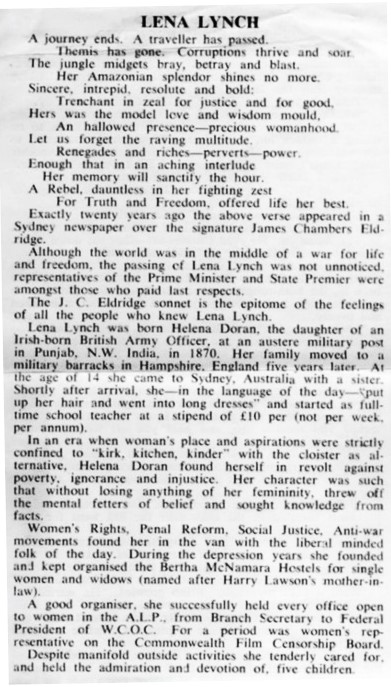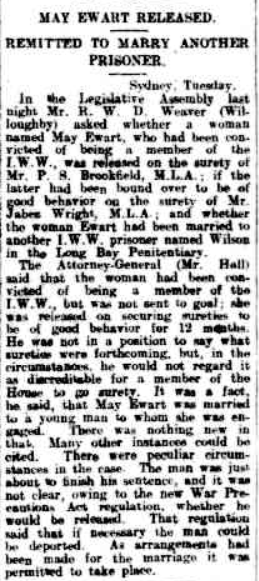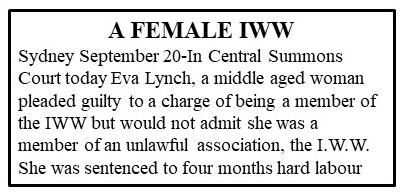Barbara Lynch and Sandra Sellick
Editors’ Introduction
Some time ago Barbara Lynch and Sandra Sellick submitted this research report to Hummer. We thought it was intriguing in its own right, pointing to what the authors term “the perils of genealogical research”. The report also highlights a different perspective on a significant actor in labour history. Lena Lynch will be best known to Hummer readers as a labour and Labor activist, a highly effective and militant trade union organiser for hospitality workers, who was integral to the networks of union and labour women fighting for women workers during and after World War One. Barbara and Sandra, however, are engaged on genealogical research focusing on this woman as a relative, seeking to untangle unproven family stories about her.
Firstly, it is important to establish Lena’s union and Labor Council profile, to supplement the genealogical profile. Lena Lynch was a trade union, labour and political activist, and an HCREU (Hotel, Club, Restaurant and Caterers Employees Union) female organiser and official during WW1 and into the twenties. Importantly for anyone tracking her life and activism, Lynch was her married name. She was politically and industrially active during the war years, both in the anti-conscription campaigns of 1916 and in supporting the strikers during the 1917 General Strike. With other labour activists, including May Matthews and Nelle Rickie, she attended Labor Council Executive at a time when the women on executive and in union leadership positions were constantly in conflict with men who ‘owned’ the labour movement, and particularly in battle regarding the relative priorities of the female wage and equal pay versus fights to raise men’s wages. So, as a union official, Lena Lynch was especially critical to the history of the NSW labour movement and to the women’s movement. Interestingly, while the authors were well aware of her union work, the role does not seem to have been highlighted in her family. It is time to draw the differing perspectives together.

Genealogical research is rife with problems arising from misinformation and baseless assumptions. That could certainly be said about our research into our ancestor Lena Lynch. This report details problems we struck when we set out to verify family narratives about her. We wanted to investigate the foundations of family stories about her, and particularly about Lena’s encounters with the law. In our search we encountered the minefield of genealogy, and were beset by fond but misinformed family stories and invalid conclusions. We drew on the wealth of information available to the amateur and the professional researcher, including from newspapers and research literature, police records, electoral rolls, registry indexes or church records. Much of this was accessible from internet sites and digitised records. Of course, the principles of distinguishing Data, Information, Knowledge and Wisdom surely apply.
Lena (born Sarah Ellen Doran) was always going to be a problematic subject. Difficulties start at her birth in 1870 in Sealkote (or Sialkot), India, a place for which records are difficult to source. Moreover, she held (or gave) different versions of her name over the years: from Sarah Ellen Doran to Helene Sarah to Helen (Hellen) to Helena to Lena.
To further confuse our searches, we found via Trove a notorious Lena Lynch living concurrently in Melbourne (Lena Lynch, a “well-known figure in Melbourne’s underworld” appeared in court for vagrancy (see ‘Lena’s Let off’, Truth 1917 [1]). We thought this was unlikely to be our Sydney-based Lena Lynch, who after all was only Lynch through marriage, and whose children included a daughter born in Paddington in Sydney in 1910.[2] Another confusing lead was Eva Lynch, gaoled for association with the IWW (the Wobblies) (see note 10 below). ‘Our’ Lena was also sympathetic to the Wobblies.

It was clear that Lena could be called a feisty lady. She was a socialist and union activist, outspoken, willing to stand up for her beliefs and not afraid to challenge the law. For example, in 1909, when a member of the International Socialists, she was charged with causing an obstruction to traffic at Taylor Square by refusing to move on when addressing a crowd of 150 people. The magistrate ordered 5 shillings fine. Her comrade Charles Rundle, who drew a crowd of 100 people, had also refused to move and was also fined. In court they asserted their right to equal treatment with others – the Salvation Army – who were not socialists, were not moved on from obstructing traffic, and were not fined.[3] She had a sound reputation as an activist in the labour movement: Labor MP J C. Eldridge wrote a sonnet which was read at her funeral, describing her as “Trenchant in zeal for justice and for good”.[4]


It is undisputed that Lena associated with IWW members.The Industrial Worker places her in Long Bay in 1917.[5] Family stories endorse that she was in gaol because of this association, holding that while incarcerated she witnessed the wedding of Wobblies May Ewart and Jock Wilson. Other publications support this.[6] Wilson, a notorious defender of the Wobblies from Melbourne, had been charged in April 1917 with being a member and with inciting action calculated to hinder operations in connection with the war. He had been sentenced to 6 months’ hard labour. May Ewart was also a key figure in the Wobblies. She had been convicted under the Unlawful Associations Act of 1917 for her union work and sentenced with 3 months hard labour, suspended.[7] Their marriage certificate cites Lena as a witness at their wedding in the gaol.

For us, the final clue in untangling our family research puzzle emerges from newspaper articles and police records about Eva Lynch, described as a “middle aged woman with three children” who, in September 1917, was charged and convicted under new laws of association to four months’ gaol with hard labour.[8] An Eva Lynch (1894 –1946), second cousin to Lena’s husband John, is listed in the family tree. Eva was born Lynch and remained a spinster, as attested to by her death notice in the Sydney Morning Herald of 22.6.46. Was she, not Lena, the member of the family who had been so involved with the IWW that she went to gaol? The connection by marriage suggests that family stories had confused the two.
Still, all these histories maintain that Lena Lynch, involved with the IWW, was at the gaol at the time of a wedding of two IWW members, while serving four months hard labour in Long Bay gaol. Family stories concur. But the question arises, where is the primary evidence? If she was arrested, convicted and served time in gaol there would certainly be police, court and gaol records of same. And are the conclusions about Lena contradicted by what we know about Eva Lynch? Seeking the original confirming evidence, we went to contemporary police, court and gaol records.
A search revealed nothing on the internet, even though many of the police and court records are digitised. There was that one press report of 5 shillings fine for obstruction, breaching Council by-laws, but nothing else found. NSW State Records holds the class of documents we needed to search but, despite digitisation, our on-line search was fruitless. A visit was the only sure way to clear up the mystery. This we did. But there were no records of a Lena, Sarah Ellen or Helen Lynch being arrested, convicted or gaoled in the period 1910 to 1920. Gaol records were very complete, but there was nothing relevant to our search. State Records staff assured us that at least one of these events would have to have been recorded had they happened.
Clearly, in the context of other research publications, this nil result is not proof that our family stories of Lena being incarcerated in Long Bay in 1917 are false. However, we believe our findings strongly indicate that our ancestor was not herself imprisoned, but simply visited Long Bay gaol to witness a wedding.
Beware the perils of genealogical research.
Editorial comment: There is another possible interpretation of the evidence unearthed by the authors. The cousin they have identified, Eva Lynch (born 1894), would have been aged around 23 in 1917 – and there is no evidence that she ever married or had children – whereas Lena (born 1870) would have been around 47 at the time with three children aged 14 or under. Lena appears a better fit for the profile of a “middle-aged woman with three children” referred to in the article at notes 8 (i and ii).
Taken together with the report that she used a number of different versions of her first names throughout her life, this suggests that Lena may have used a different first name again on the occasion of this charge, possibly to escape the more severe sentence likely given her earlier conviction. Because she gave the same family name, very probably the court would not have detected the inaccuracy – as they might have done had she claimed to be for example a Lottie Lyell or a Louise Lovely.
Bibliography
Labour Australia, “Lynch, Ellen Sarah (Lena) (1870–1943)”, http://labouraustralia.anu.edu.au/biography/lynch-ellen-sarah-lena-23077
This biography references several publications which, in particular, augment information on Lena Lynch and her union / ALP work.
McIlroy, Jim Australia’s First Socialists, Resistance Books 2003
Burgmann, Verity Revolutionary Industrial Unionism: The Industrial Workers of the World in Australia Cambridge University Press 1995

[1] “Lena’s Let Off”: Truth 28.7.1917
[2] Editors’ note: Labour Australia lists four children born to Lena and John Lynch between 1896 and 1910. Her eulogy claims five.
[3] ‘Obstructing the Traffic’ The Sydney Morning Herald, 28.1.1909 p7;
[4] Death notice Lena Lynch 23.9.1943; Eulogy by John Lynch: Bohemian Journal September 1943; Sonnet by JC Eldridge for Lena Lynch 1943.
[5] The Industrial Worker, Issue #1733, March 2011 www.iww.org/node/5372
[6] Verity Burgmann in Revolutionary Industrial Unionism: The Industrial Workers of the World in Australia, p 100: Labour Australia, ‘Lynch, Ellen Sarah (Lena) (1870–1943)’ [from Biographical Register of the Australian Labour Movement 1788-1975</, 2012]
http://labouraustralia.anu.edu.au/biography/lynch-ellen-sarah-lena-23077: Jim McIlroy in Australia’s First Socialists;
[7] May Ewart Released’, Sydney Morning Herald, 23.10.1917
[8] (i) ‘A Female IWW’, Townsville Daily Bulletin, 22.9.1917 p.5
(ii) ‘IWW Women’, Truth (Brisbane) 30.9.1917 p.10
